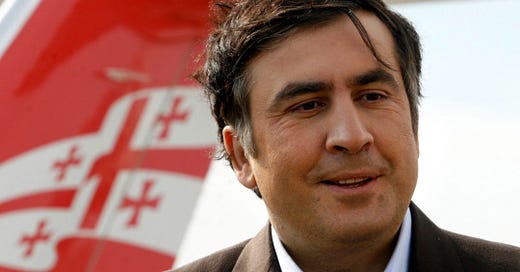Former President Mikheil Saakashvili, leader of Georgia’s 2003 Rose Revolution, the man who proved post-Soviet democracy possible, lies near death in a Georgian prison. He has been on a hunger strike since October 2. Beyond the obvious human tragedy, his death may explode into a political crisis of global proportions—Georgia’s current government risks having a political prisoner die at its hands.
Although foreign policy scribblers and unemployed diplomats may propound various solutions, there is only one way out. Saakashvili must be released from prison and moved to a high-tech hospital immediately. His Georgian citizenship must be restored forthwith. And national elections, now scheduled for 2024, must be advanced. Only Georgians can decide how to govern their country.
For the moment, Saakashvili’s health is the paramount concern. “I warn you that this is the limit,” his doctor, Ekaterine Mkheidze, told a press conference. “Mikheil Saakashvili must immediately be transferred to a clinic."
U.S. Ambassador Kelly Degnan said, “We are very concerned about Mr. Saakashvili’s well-being…I am glad to see that there is a multidisciplinary team monitoring his conditions and we are also closely monitoring his condition.”
But despite the recommendations of the prison system’s own medical council, the government says that, if needed, Saakashvili will be moved to the inadequate Number 18 Gldani prison hospital, on the northern edge of Tbilisi. At the time of this writing, the former president languishes in Number 12 prison in Rustavi, a town southeast of Tbilisi. “Don’t worry, we will take good care of the inmate Saakashvili,” said Prime Minister Irakli Garibashvili, who insists that Saakashvili will serve his full six-year prison sentence.
After leading the peaceful Rose Revolution in November 2003, Saakashvili served two terms as Georgia’s president, from 2004 to 2013. In 2012, he conceded that his United National Movement Party had been defeated in parliamentary elections, and Georgian Dream Party leader Bidzina Ivanishvili became prime minister. Constitutionally barred from seeking a third term, rumors were rampant that Saakashvili would somehow carry out a coup and remain in office. Nothing of the kind happened. Giorgi Margvelashvili, the Georgian Dream candidate, was elected president. It was a democratic, peaceful transfer of power. Saakashvili left Georgia.
From then, the former Georgian president had a topsy-turvy career, living in the Netherlands, Ukraine and the United States. He accepted Ukrainian citizenship to become governor of Ukraine’s Odesa Oblast, a move that cost him his Georgian citizenship.
In 2014, the Georgian Dream government filed charges against Saakashvili for exceeding official powers and embezzling funds. The United States and the European Union expressed concern over the apparent political nature of the charges. Interpol refused Tbilisi’s request to put Saakashvili on its watchlist. Ukraine refused to extradite him.
In 2018, the Tbilisi City Court twice tried Saakashvili in absentia and sentenced him to six years in prison for abuse of power. A return to Georgia would have led to instant conviction and imprisonment.
Saakashvili surreptitiously returned to Georgia on October 1, the eve of local elections. He was arrested within hours. He declared a hunger strike the following day.
To understand Misha, as he is commonly known in Georgia, one must look back to the Rose Revolution. Anyone who was in Georgia before 2003 remembers—rampant corruption, widespread poverty, decaying structures, Russian harassment, blackouts, and an uncertain future were driving people into the ground. Georgia was just another island in the post-Soviet archipelago, a country without hope. The Rose Revolution brought hope.
People fixed up their apartments, stores and restaurants opened, tourists appeared, infrastructure was gradually repaired, the economy flourished, and a trusted police force patrolled the streets. Georgia could legitimately aspire to NATO membership. And Misha was the only western leader with the courage to stand up to Vladimir Putin.
Georgia was a transitional democracy, and as a transitional democracy, it had deficiencies. Saakashvili made mistakes, as did the government over which he presided. But the important thing to remember is that he guided Georgia along a path that no country that had endured the full 70 years of Soviet occupation had traveled. The Georgian Constitution dictated that his time as president was up. He accepted that. The Georgian people decided that his party should no longer govern. He accepted that. And that is how he should be judged.
If there were things to be investigated and prosecuted, then this should have been carried out in a forthright manner in strict accordance with the rule of law. Democratic countries do not hurl former presidents into prison.
Unsurprisingly, Saakashvili supporters and opponents have taken to the streets of Tbilisi and other Georgian cities and towns. It is a political mess that cannot be cleared up with artificial solutions, particularly ones ginned up outside Georgia. There is only one way out—release Saakashvili and let Georgians decide their country’s next steps at the ballot box.
*Ambassador David J. Smith has been the U.S. Member of the International Security Advisory Board for Georgia and adviser to the National Security Council of Georgia and the Ministry of Defence of Georgia.
Copyright © David J. Smith, 2021




